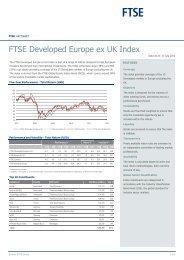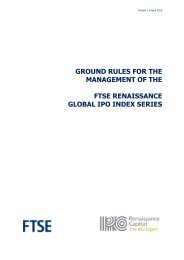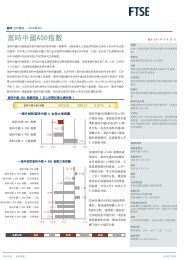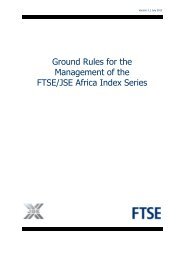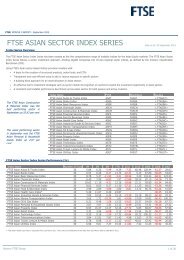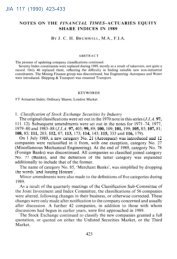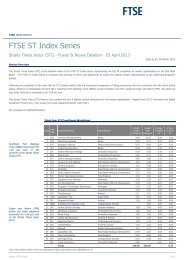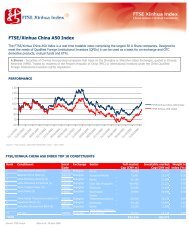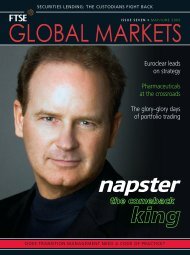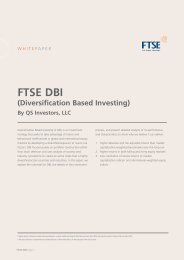Section 2 - FTSE
Section 2 - FTSE
Section 2 - FTSE
You also want an ePaper? Increase the reach of your titles
YUMPU automatically turns print PDFs into web optimized ePapers that Google loves.
AUTOMATING OTC DERIVATIVES<br />
72<br />
Karel Engelen, policy director and head of FpML at ISDA, says the<br />
summer volume surge spilled over into novations, which are much less<br />
automated than regular trades. A novation allows a new legal entity<br />
to substitute for one of the original counterparties to a bilateral<br />
derivative contract, so it requires the consent of all three parties.<br />
Photograph kindly supplied by ISDA, October 2007.<br />
Novations caused much of the paperwork backlog that<br />
drew regulators’ attention to credit default swaps in the<br />
first place two years ago. In response, ISDA developed its<br />
Novation Protocol to standardise and speed up the<br />
procedure. That helped the industry get backlogs under<br />
control, but the process still requires manual<br />
intervention. “There is a renewed focus on looking for<br />
electronic solutions for novation consents,”says Engelen.<br />
Up to now, automation has focused on immediate posttrade<br />
processing but market participants are starting to<br />
explore electronic solutions for the entire product life<br />
cycle, including novations, portfolio reconciliation and<br />
collateral management.<br />
Engelen expects the spread of electronic processing to<br />
facilitate the introduction of new products, too. A higher<br />
degree of automation makes it easier to handle new products<br />
and shifts the point at which automated processing is<br />
economic earlier in the product life cycle. Manual processing<br />
will never disappear, though. It takes time for market<br />
participants to agree on standard terms for new products and<br />
until they do automation is virtually impossible.<br />
Janet Wynn, general manager and managing director of<br />
DTCC Deriv/SERV, says the firm’s electronic platform and<br />
data warehouse have already proved their worth. For<br />
example, when a troubled hedge fund is taken over, the<br />
entire credit default swaps portfolio can be assigned to an<br />
acquirer through DTCC’s platform in just a few days. In the<br />
past, a buyer had to print out and pore over thousands of<br />
pages of documentation just to see what was in the<br />
Mark Beeston, president of T-Zero, a London-based electronic affirmation<br />
service.The immediate crunch was in booking trades and executing<br />
documents, but the whole operations function was swamped, notes<br />
Beeston.“You cannot borrow bodies out of your other areas,”he says,“At<br />
the time you need those resources they are exceptionally busy doing their<br />
own thing.”Photograph kindly supplied by T-Zero, October 2007.<br />
portfolio and how to handle the assignments, a process<br />
that could take several weeks.<br />
Wynn notes that although backlogs increased over the<br />
summer they were nowhere near as bad as when regulators<br />
sounded the alarm in September 2005. She points out that<br />
back office staff had enough capacity to handle other<br />
projects over the summer as well. The big firms finished<br />
loading their historical portfolios into DTCC’s data<br />
warehouse and participated in a test of payment<br />
calculations for the settlement system DTCC will launch<br />
later this year.“There is no paralysis out there,”Wynn says,<br />
“Everybody is working very hard. There are a lot more<br />
exceptions to handle but it is very much under control.”<br />
The industry cannot afford to sit still, however.<br />
Automation frees up back office resources to focus on<br />
novations and breaks, but if OTC derivatives keep up their<br />
breakneck volume growth the need for staff is bound to<br />
increase, too. “Without DTCC’s platform the volume of<br />
trades could not have happened,” says Wynn, “And they<br />
could never have handled this surge.”<br />
So far, automation has helped back offices stay one step<br />
ahead of the game. They have moved away from<br />
processing every trade toward handling exceptions, but<br />
that function isn’t scalable. If it takes 50 people in a<br />
dealer’s back office to sort out 20% of today’s trades it will<br />
take twice as many when volume doubles – and qualified<br />
staff are hard to find. At some point, the industry has to<br />
tackle the error rate, through either greater reliance on<br />
affirmation or electronic trading.<br />
NOVEMBER/DECEMBER 2007 • <strong>FTSE</strong> GLOBAL MARKETS



